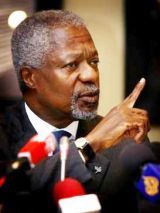Annan against using UN forces in Chad, Central African
Jan 3, 2007 (UNITED NATIONS) — Former Secretary-General Kofi Annan recommended against deploying U.N. peacekeepers in Chad and the Central African Republic to address spillover from the Darfur conflict until all parties agree to a ceasefire and start talks aimed at a political solution.
 The United Nations is still pressing, however, for the Sudanese government to approve the deployment of a “hybrid” African Union-United Nations force in Darfur with 17,300 military personnel and 5,300 police.
The United Nations is still pressing, however, for the Sudanese government to approve the deployment of a “hybrid” African Union-United Nations force in Darfur with 17,300 military personnel and 5,300 police.
Annan’s successor, Ban Ki-moon, who took the reins of the United Nations on New Year’s Day, is scheduled to meet the special envoy for Darfur, former Swedish foreign minister Jan Eliasson, on Wednesday. Ban told reporters Tuesday he put “my highest attention on this” issue in hopes of resolving the conflict peacefully as soon as possible.
In a report sent to the Security Council in late December before he stepped down, Annan said there is a need to address “the rapidly deteriorating security situation and to protect civilians in the border areas” of Chad and the Central African Republic. The report was obtained Tuesday by The Associated Press.
But he said the deployment of a U.N. peacekeeping force would face “considerable risks” because of continuing hostilities between the governments of Chad and the Central African Republic and rebel groups, limited prospects for dialogue, and no signs of “a credible and inclusive political process in Darfur.”
U.N. troops could become the target of attacks by rebel groups if they perceived the peacekeepers were interfering with their cross-border activities, Annan said.
“Unless all the concerned parties were to agree to a ceasefire and engage in an intra- and inter-state dialogue aimed at a political solution, a United Nations force would be operating in the midst of continuing hostilities and would have no clear exit strategy,” he said.
“The conditions for an effective United Nations peacekeeping operation do not therefore seem to be in place at this time,” Annan concluded.
The report urged countries with influence on Chad and the Central African Republic and their rebel groups to “redouble their efforts” to promote a political solution and national reconciliation.
It stressed that any U.N. presence in the two landlocked countries “would pose enormous logistical challenges.”
“The area of operations is characterized by difficult terrain, extreme weather conditions, very poor infrastructure and absence of major airfields, and very long distances from the seaports,” it said.
Annan sent an assessment mission to both countries from Nov. 21 to Dec. 3 where members met with the presidents and government officials. But because of attacks and insecurity in the border regions the mission was unable to visit eastern Chad or northeastern Central African Republic.
As a result, Annan said, the mission could not develop “full-fledged recommendations” on a possible U.N. presence in the two countries and cautioned that the report should be treated as “preliminary findings” that need to be confirmed and adjusted by further assessments.
The mission did confirm that the conflicts in Darfur, Chad and the Central African Republic “are increasingly interlinked, posing considerable threats” to security in the area, the report said.
“The Darfur conflict has already spilled over into Chad with serious consequences to this country and beyond,” the report said. The government of the Central African Republic claims Sudan is backing rebels in its northeast.
Conflict erupted in Darfur in February 2003 when the mostly African ethnic tribes rebelled against the Arab central government. Violence has claimed some 200,000 lives and forced 2.5 million people from their homes in this vast arid area.
Chadian rebels bent on toppling President Idriss Deby have clashed with government forces since 2005. The rebels have been able to exploit volatility in Sudan, establishing bases in the troubled Darfur region. The upsurge in violence in Darfur and eastern Chad has also made the two northern provinces of the Central African Republic virtually “no-go areas” for nearly a year.
According to the report, Chad is experiencing “a multi-faceted humanitarian crisis” linked to the conflict in Darfur and the instability in the northern Central African Republic. At the end of November, Chad was hosting about 232,000 refugees from Darfur and 48,000 refugees from the Central African Republic – along with 92,000 Chadians displaced as a result of the recent fighting.
The humanitarian community in the Central African Republic also reported that the situation is deteriorating rapidly, with more than 1 million of the country’s 3.8 million population affected, the report said. Tens of thousands of civilians are currently living in the bush with minimal shelter and water, and at least 70,000 have been displaced in the hard-hit northwest, it said.
The report outlines two possibilities for a U.N. peacekeeping mission – one brigade-sized that would observe the situation in the border areas and provide early warning, the other division-sized that would not only monitor the border but deter attacks and provide protection to civilians, within its capabilities.
While Annan recommends against deploying a force, he said if the Security Council decides to establish a U.N. presence in eastern Chad and northeastern Central African Republic it should choose the larger mission that would protect civilians under threat.
The smaller mission’s deployment, he said, “would be fraught with unacceptable risk and raise expectations that would likely be disappointed.”
(AP)
